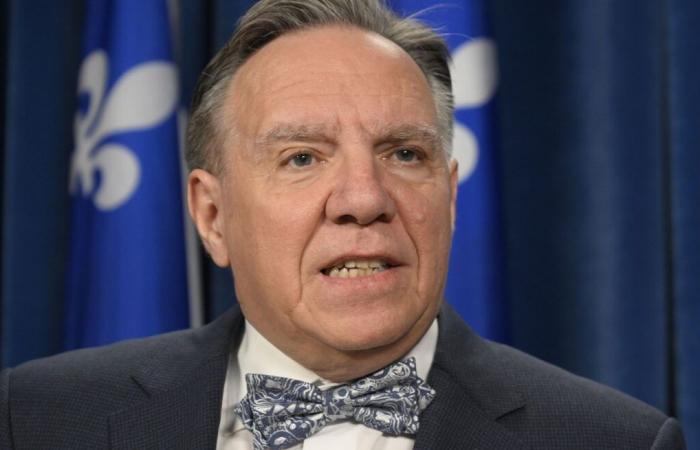
François Legault pointed the finger Friday at the pro-Palestinian camps established in Montreal when questioned about his desire to ban prayer in public. An exit that came at a time when associations criticized him for using Muslims for political purposes.
“There are Islamists who are trying to take control, and I am going to protect Quebec values,” the Prime Minister said Friday morning on the show Bored in the morningon the airwaves of 98.5 FM.
François Legault reiterated she wants to go further than the Law on State Secularism in particular to prohibit prayer in public.
To the host who pointed out to him that he had not often heard of problems linked to Muslims praying in public, the Prime Minister replied “that at one point”, the “traffic was blocked because that they were doing prayers in the streets,” but that there was “more than that.”
“There were camps for weeks in front of my office, in front of McGill. And there are Jewish students who were afraid to go to school,” he added, before specifying that it was “the same people.”
“At a given moment, it’s a set of actions,” he said, also mentioning that “in schools,” “little girls are not allowed to play sports,” which had been mentioned in the Bedford School report.
During a second interview, this time at Midi infoto ICI Première, the Prime Minister maintained that it was “many of the same people that we find in the camps, in the streets, those who scare the rector of McGill and the Jewish community.” He specified that the prayer sessions which had disturbed him had occurred “repeatedly” during the summer and that the police had not been warned “in advance” of their holding.
François Legault maintained that the conflict in Gaza should not be “imported” to Montreal and defended targeting Muslims. “I know plenty of Muslims who are well integrated into our values in Quebec and there are no problems with Muslims, but we have a problem when we have Islamists who try to take control of the school and that it turns into violence as we have seen, then into camps, then preventing students from going to school. »
Worried Muslim associations
In the morning of Friday, the Consultation Table of Muslim Organizations of Quebec (TCOM) issued a press release to express “its concerns regarding the instrumentalization of the Muslim community for electoral purposes, in particular through the recent declarations of the Prime Minister of Quebec concerning public prayers.
The signatories of the document are the Islamic Cultural Center of Quebec, the Association of Muslim Students of Laval University, the Association of Muslims of Greater Lévis, the Capital Mosque Association, the Islamic Socio-Cultural Association louperivoise, BelAgir-Québec and the local section of the Canadian Muslim Association.
The press release alludes to the Prime Minister’s exit during the review of the parliamentary session of December 6, during which Mr. Legault put forward the idea of banning prayer in public for the first time. “We are looking at all possibilities, including the use of the derogation clause. We do not want to see prayers in the streets,” François Legault then said. In his opinion, prayer should be done “in a church, in a mosque, but not in public places”. “To see people praying in the streets, in public parks, that’s not something we want in Quebec,” he said.
The notwithstanding provision allows governments to formally override certain sections of the Canadian Charter of Rights and Freedoms.
The Prime Minister’s remarks, argues the TCOM, divert “attention from the real concerns of Quebecers”, such as francization, the rise in the cost of living, access to health care and housing, as well as maintaining essential infrastructure, such as roads, schools and hospitals.
They add that “this type of populist discourse” risks “further dividing Quebec society and weakening social harmony”, and that it “reinforces stereotypes and fuels distrust towards Quebecers of Muslim faith”.
The group concludes by saying, however, that it is “open” to “a dialogue on the issue of public prayers, with the aim of finding balanced solutions in harmony with the values of inclusion and mutual respect that underpin our nation.”





